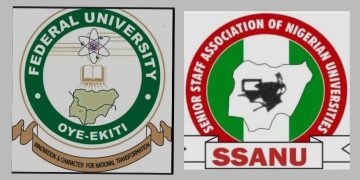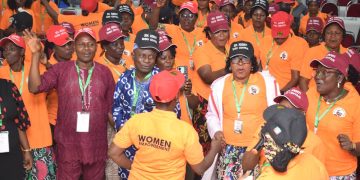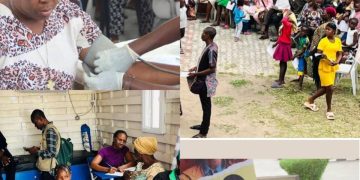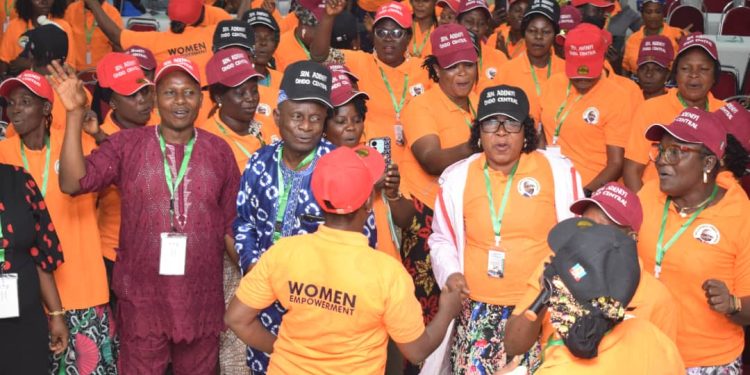By Ayo Arowojolu
The Agricultural Media Resources and Extension Centre(AMREC) of the Federal University of Agriculture, Abeokuta(FUNAAB) has recently extended its ambit of operations to Ondo State which forms part of its catchment areas spanning the entire South West Region.
For four days, two weeks ago, AMREC, which is the third arm of the tripartite mandate of FUNAAB launched a strategic move in Akure, the Ondo State capital, to facilitate training and empowerment programme for hundreds of women in garri processing targeted at improving rural livelihoods and strengthening food security.
The trainees represent some select garri-processing women from the Ondo Central Senatorial District in partnership with the Federal Ministry of Agriculture and the Facilitator, Senator Adeniyi Adegbonmire(SAN) who is the representative of the District at the National Assembly.
The training initiative was tailored to build the capacity of women in modern cassava processing techniques, improve product quality, and promote value addition, just as the overarching goal was to empower women with the knowledge and tools needed to increase their earnings and contribute meaningfully to the economic development of their communities.

Garri, a staple food made from cassava roots, is widely consumed across various regions of Nigeria and serves as a primary carbohydrate
source for millions of Nigerians.
Cassava, from which garri is produced, is one of Nigeria’s most cultivated crops due to its adaptability to diverse agro-ecological conditions and its resilience to drought and poor soil quality.
It is widely acclaimed that Nigeria is the world’s largest producer of cassava roots, contributing significantly to the country’s
agricultural GDP.
However, despite its economic importance, garri processing remains largely informal and labor-intensive, especially in rural communities where Women dominate the workforce.

Prof. Olalekan Jacob Olaoye, Director, AMREC, who led the FUNAAB Team of trainers, addressed the trainees and went down memory lane on the importance of women’s participation in the Garri value chain
women play a vital role in the agricultural sector, particularly in cassava production and processing.
In Ondo Central Senatorial District, as in many other regions of Nigeria, women constitute a big
majority of the labour force in garri processing as they engage in various stages of the production process, including peeling, grating, fermenting, pressing, roasting, and packaging.
The participation of women in this trade not only provides them with a source of income but also contributes to household food security and poverty alleviation.
Despite the significant contributions of women, according to Prof. Olaoye, women in garri processing face numerous challenges, such as lack of access to modern processing equipment, inadequate financial support, poor market linkages, and exposure to occupational hazards.
Prof. Olaoye further said the traditional methods used in processing often involve heavy physical labor and health risks, including exposure to smoke from roasting and injuries from manual grating.

To him, it is for these reasons that empowering women with improved skills, modern technology, and entrepreneurial knowledge are needful for productivity, improved product quality, and increase profitability.
Overall, Prof Olaoye listed the gains of the training. The attendees gained necessary knowledge, skills, and resources to improve their efficiency and profitability in garri processing, even as they enhanced technical knowledge of modern garri processing techniques to promoting the adoption of best practices in food safety, hygiene, and environmental sustainability.
Speaking on the expected outcomes of the training, the AMREC Director gave assurance that the much-needed business and entrepreneurial skills have been imbued in the women to enable them scale up their garri processing ventures, just as their eyes were opened to
numerous access to finance, market opportunities, and cooperative networking for improved business sustainability.
The trainees also learnt safer processing methods geared at reducing occupational hazards and improving working conditions.
Prof Olaoye submitted: “Through all the structured training, practical demonstrations and access to essential resources over the past four days, I am confident that this training workshop will bridge the knowledge gap, foster innovation and create an enabling environment for women in the garri valu e chain.”
Other top officers who accompanied the AMREC Director to the Akure event included Dr. Olubukola Idowu, Mr. Taiwo Olabode, Mr. Adedayo Ayegbokiki and Mrs Sowande.































































